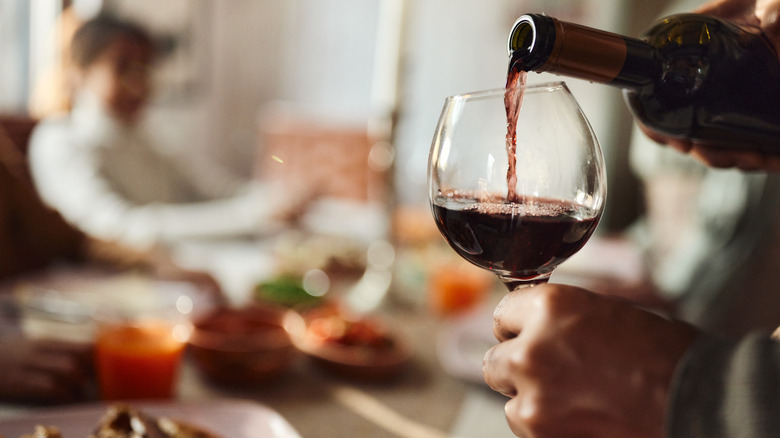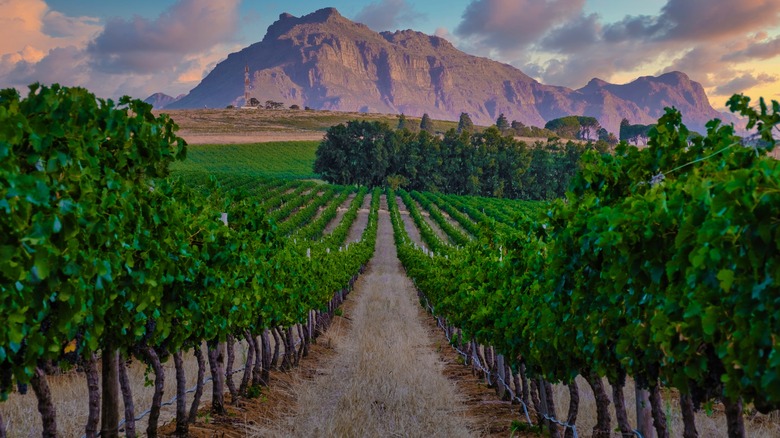The Wine Term Some Sommeliers Ditched 'Minerality' For
Minerality has long been the center of controversy among passionate sommeliers (a dramatic group even on a good day, spoken as a member). On one hand, it can be a fun, theatrical vocab buzzword, so when you're practicing proper etiquette at a wine-tasting event and say "I'm detecting some ... minerality," your fellow tasters can nod solemnly and know that you're better than them. On the other hand, scientists aren't 100% sure that minerality is even a real thing; they're pretty sure it isn't.
"Minerality" refers to the qualities of a region's soil or indigenous rock types. According to one definition by celebrity sommeliers Mike DeSimone and Jeff Jenssen, per Robb Report, "The flavors described [in minerality] generally have to do with rocks or fossils, such as stone, river rock, flint, gravel, slate, asphalt, and oyster shell." Still, even if it were a scientifically real phenomenon (which it isn't), the "minerality" flavor descriptor is heavily based on unquantifiable individual perception and can vary per each sipper's opinion.
In 2018's "The Sommelier's Atlas of Taste," James Beard Award-winning sommelier Rajat Parr argues for a replacement word for the concept: "Electricity." Per the book, via Wine Enthusiast, Parr describes this quality as a physical "electric sensation that produces tension in the wine ... from vines planted in intensely rocky sites." Indeed, whether or not introducing a new term like "electricity" is the move, the heart of what people are talking about when they say "minerality" is ultimately just a subcategory of terroir.
This wine is electric (boogie woogie woogie)
One study by Alex Maltman of Aberystwyth University, published in the Journal of Wine Research, argues that wine minerality doesn't exist because it can not exist. "The mineral nutrients in wine normally have minuscule concentrations and they lack flavor anyway," writes Maltman. "Whatever minerality is, it cannot literally be the taste of minerals in the vineyard rocks and soils." Vineyard roots don't take up geological minerals in the soil like feldspar, quartz, gypsum, chalk, flint, or graphite and transfer them to the grapes. Vineyard roots only take up necessary minerals like magnesium, zinc, or iron, which are tasteless.
Some sommeliers (not to be confused with ciceroni) seek to support the minerality argument with particularly unique blends, like different regional Burgundies, or the red wines from South Africa where the granite-rich soil retains heat and lowers acidity, creating a stony "wet concrete" flavor. But, what's being talked about with examples like these is the geological origin and an expression of the soil — which is "terroir," not "minerality."
Terroir refers to the way that the land of genesis influences the grapes. The word is a French evolution of the Latin "terra" meaning "earth" or "soil." Hotness, coolness, soil composition, topographic elevation and slope, whether the grapes receive direct or indirect sunlight, other plants growing nearby, and the agricultural practices of the region can all have an impact. In some regions (like the Willamette Valley) the influence is heavy, while in other regions, it's imperceptible.
Whatever you choose to call it, just don't call it minerality
The vogue "minerality" is a pretty new term. One of its first appearances is in the fourth edition of "The Oxford Companion to Wine" published in 2015, but regardless of whenever it finally cropped up, "minerality" never received a fully-developed definition. As Parr's co-author Jordan Mackay elaborates, "[Minerality] means different things to different people, and is thus hard to define and perhaps of questionable value...We don't speak of literal minerals in wine; we speak of a poetic characteristic that reminds us in some ways of stones, rocks, metals, and minerals," via Wine Enthusiast.
Unlike minerality, which is largely based on "feel," terroir has quantifiable, universal implications. For instance, grapes from cooler climates tend to be dry and acidic, while grapes from warmer climates tend to be sweeter and higher in alcohol. Still, entering "poetic" territory with wine vocab words can feel a little ... yucky. Call a wine "loud" or "alive" at a wine tasting with a straight face — we dare you not to cringe.
It's a tricky territory (or, for sommeliers, "crunchy terroir") because wine-lovers should be able to describe a wine in more specific, descriptive terms than "This is a good wine." But, at least for now, the realm of the "terroir" lexicon offers enough poetic playground for even the most Dionysian sommeliers to get the job done. If you feel inclined to pepper in an "electric" during your next winery tour, that's your call.


